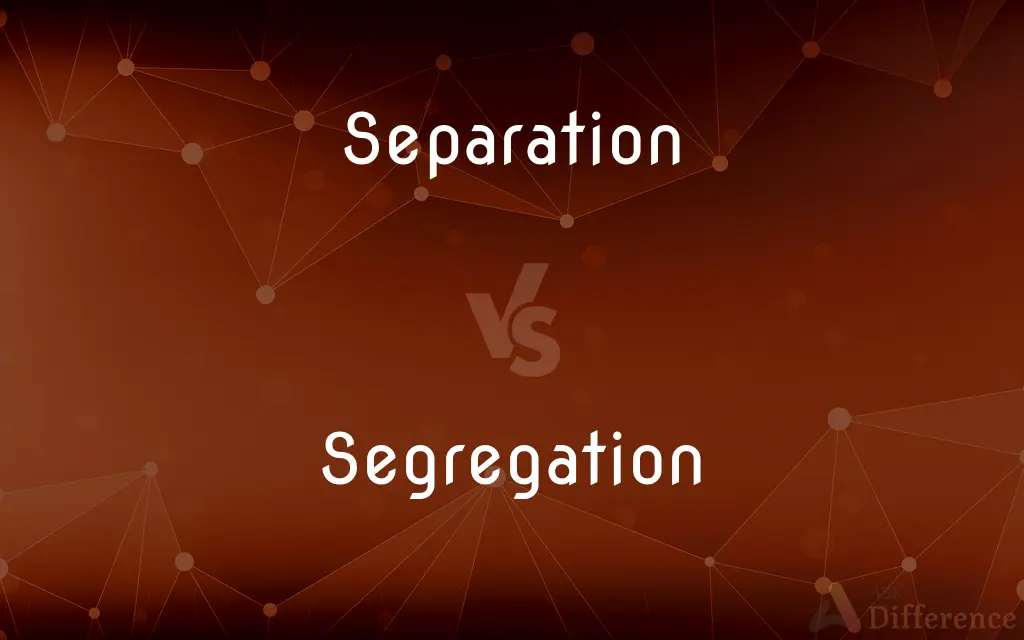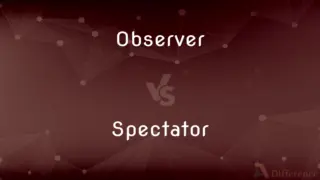Separation vs. Segregation — What's the Difference?
Edited by Tayyaba Rehman — By Urooj Arif — Updated on April 1, 2024
Separation involves dividing elements into parts or groups, often neutrally, whereas segregation implies a division based on discriminatory reasons, particularly in social contexts.

Difference Between Separation and Segregation
Table of Contents
ADVERTISEMENT
Key Differences
Separation is a broad term that can apply to various contexts, from physical division to the dissolution of relationships, indicating a neutral or mutual parting. Segregation, on the other hand, specifically refers to the enforced separation of groups, often based on race, religion, or gender, and carries a negative connotation linked to discrimination and inequality.
In scientific contexts, separation is a process used to distinguish different components, such as in chemistry where substances are divided based on their properties. Whereas segregation doesn't typically apply to science in the same way, but rather to societal issues where certain groups are isolated from others due to prejudicial beliefs.
Legal systems may also use the term separation in the context of marital dissolution, referring to it as a legal process without the negative implications of segregation, which in legal contexts often relates to historical laws enforcing racial separation.
Educationally, separation can refer to the division of students based on abilities or interests, aiming to tailor education to individual needs. Segregation in education, however, has been historically used to keep racial or ethnic groups apart, denying equal educational opportunities.
In terms of intent, separation can be voluntary or based on practical reasons, such as the separation of recyclables from trash. Segregation, by contrast, is usually imposed and driven by discriminatory motives, aiming to privilege one group over another.
ADVERTISEMENT
Comparison Chart
Definition
The act of dividing or parting elements without discriminatory intent.
The enforced separation of groups based on discriminatory criteria.
Contexts
Broad, including science, relationships, and education.
Primarily social, with a focus on racial, religious, or gender divisions.
Connotation
Neutral or mutual; often practical or necessary.
Negative; associated with discrimination and injustice.
Legal Implications
Can be a mutual decision, e.g., legal separation.
Historically linked to laws that enforce racial or other discrimination.
Educational Context
Can be based on abilities or interests.
Historically used to deny equal opportunities to certain racial or ethnic groups.
Intent
Can be voluntary or based on practicality.
Imposed and driven by prejudice.
Compare with Definitions
Separation
The process of legally ending a marriage.
They opted for a separation agreement before finalizing their divorce.
Segregation
A policy or practice that separates people based on race, class, or other criteria.
Segregation policies were abolished, but their effects linger in society.
Separation
The act of isolating a substance from a mixture.
The lab technician used centrifugation for the separation of blood components.
Segregation
The act of setting apart or isolating a group.
The segregation of infected individuals is a critical step in controlling the outbreak.
Separation
The division into distinct parts or groups.
The separation of recyclable waste from non-recyclable is essential for environmental conservation.
Segregation
A social system that divides groups in everyday activities.
Even after laws changed, social segregation remained in many areas.
Separation
A method of sorting based on specific criteria.
The company implemented a separation of duties to improve security.
Segregation
The enforced separation of different racial, social, or religious groups.
The museum exhibit detailed the history of racial segregation in the country.
Separation
The distancing or parting of individuals or groups.
The separation of the siblings was temporary, owing to educational commitments.
Segregation
The division based on discriminatory practices in education.
The school district worked to address issues of segregation and inequality in schools.
Separation
The act or process of moving apart or forcing something apart
The separation of continents from a single landmass.
The separation of railroad cars from a train.
Segregation
The act or process of segregating or the condition of being segregated.
Separation
The condition of being apart, especially the condition of two people who had lived together or been married living in different places.
Segregation
The policy or practice of separating people of different races, classes, or ethnic groups, as in schools, housing, and public or commercial facilities, especially as a form of discrimination.
Separation
An interval or space that separates; a gap
The separation between the lead runner and the pack was getting longer.
Segregation
(Genetics) The separation of paired alleles or homologous chromosomes, especially during meiosis, so that the members of each pair appear in different gametes.
Separation
The process of sorting or distinguishing into different components, groups, or categories
The gradual separation of the sciences into physical and biological.
Segregation
The setting apart or separation of things or people, as a natural process, a manner of organizing people that may be voluntary or enforced by law.
Separation
The condition of being so sorted or distinguished
The unquestioned separation of labor by gender.
Segregation
(biology) The setting apart in Mendelian inheritance of alleles, such that each parent passes only one allele to its offspring.
Separation
The voluntary cessation by spouses of cohabitation and other marital relations.
Segregation
(mineralogy) Separation from a mass, and gathering about centers or into cavities at hand through cohesive or adhesive attraction or the crystallizing process.
Separation
A formal legal severing of the relations between spouses that does not dissolve the marriage as in divorce.
Segregation
(sociology) The separation of people (geographically, residentially, or in businesses, public transit, etc) into various categories which occurs due to social forces (culture, etc).
Separation
In some jurisdictions, divorce.
Segregation
(genetics) The separation of a pair of chromatids or chromosomes during mitosis and meiosis
Separation
Discharge, as from employment or military service.
Segregation
The act of segregating, or the state of being segregated; separation from others; a parting.
Separation
The act of disuniting two or more things, or the condition of being separated.
Segregation
Separation from a mass, and gathering about centers or into cavities at hand through cohesive attraction or the crystallizing process.
Separation
The act or condition of two or more people being separated from one another.
Segregation
(genetics) the separation of paired alleles during meiosis so that members of each pair of alleles appear in different gametes
Separation
The act or condition of a married couple living in separate homes while remaining legally married.
Segregation
A social system that provides separate facilities for minority groups
Separation
(legal) An agreement legalizing such an arrangement.
Segregation
The act of segregating or sequestering;
Sequestration of the jury
Separation
The place at which a division occurs.
Separation
An interval, gap or space that separates things or people.
Separation
An object that separates two spaces.
Separation
(military) Departure from active duty, while not necessarily leaving the service entirely.
Separation
The act of separating, or the state of being separated, or separate.
Separation
The act of dividing or disconnecting
Separation
Coming apart
Separation
The state of lacking unity
Separation
The distance between things;
Fragile items require separation and cushioning
Separation
Sorting one thing from others;
The separation of wheat from chaff
The separation of mail by postal zones
Separation
The social act of separating or parting company;
The separation of church and state
Separation
The space where a division or parting occurs;
He hid in the separation between walls
Separation
Termination of employment (by resignation or dismissal)
Separation
(law) the cessation of cohabitation of man and wife (either by mutual agreement or under a court order)
Common Curiosities
Can separation ever be considered positive?
Yes, separation can be positive or necessary, such as in scientific processes or when individuals mutually decide to part ways for personal growth.
Can separation lead to segregation?
In some contexts, what begins as neutral separation based on preferences or abilities can inadvertently lead to segregation if not carefully managed.
Are there laws against segregation?
Yes, there are numerous laws and regulations worldwide aimed at preventing segregation and promoting equality.
How does segregation affect society?
Segregation negatively impacts society by promoting inequality, hindering social integration, and perpetuating stereotypes.
How does segregation manifest in education?
Historically, segregation in education meant the physical separation of students by race; now, it can also refer to unequal resources and opportunities.
Can separation be temporary?
Yes, separation can be a temporary measure, such as when couples separate before deciding on divorce or when scientists isolate substances for study.
What is the key difference between separation and segregation?
The key difference lies in the intent and context: separation is a neutral division, while segregation involves discriminatory practices.
Is segregation always illegal?
While many forms of segregation are illegal, especially those based on race or ethnicity, discriminatory practices can still exist in subtle forms.
Why is separation important in recycling?
Separation in recycling ensures that materials are processed correctly, conserving resources and reducing environmental impact.
How did segregation end in the United States?
Segregation officially ended through a series of legislative acts and court decisions, notably the Civil Rights Act of 1964, but the fight against its remnants continues.
What is a legal separation?
A legal separation is a court agreement that allows a married couple to live apart while remaining legally married.
What role does segregation play in social dynamics?
Segregation can reinforce social hierarchies and barriers, contributing to ongoing discrimination and social tension.
How is segregation addressed in international law?
International law, through declarations and treaties like the Universal Declaration of Human Rights, condemns segregation and promotes equality.
Can workplace segregation still occur?
Yes, workplace segregation can occur when employees are separated by race, gender, or other characteristics, often leading to inequality in opportunities and treatment.
What measures can be taken to prevent segregation?
Preventing segregation involves legal action, education on equality, promoting diversity and inclusion, and addressing the underlying prejudices that fuel segregation.
Share Your Discovery

Previous Comparison
Observer vs. Spectator
Next Comparison
Alloy vs. BrassAuthor Spotlight
Written by
Urooj ArifUrooj is a skilled content writer at Ask Difference, known for her exceptional ability to simplify complex topics into engaging and informative content. With a passion for research and a flair for clear, concise writing, she consistently delivers articles that resonate with our diverse audience.
Edited by
Tayyaba RehmanTayyaba Rehman is a distinguished writer, currently serving as a primary contributor to askdifference.com. As a researcher in semantics and etymology, Tayyaba's passion for the complexity of languages and their distinctions has found a perfect home on the platform. Tayyaba delves into the intricacies of language, distinguishing between commonly confused words and phrases, thereby providing clarity for readers worldwide.













































